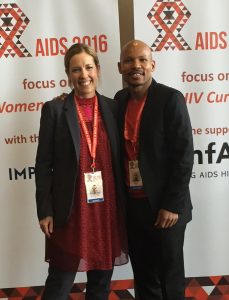AIDS2016: Opening One Door to Chronic Care

‘Thinking Collectively on Integrated Healthcare in Communities’ panel at 21st International AIDS Conference (AIDS 2016). Courtesy: Medtronic Foundation.
By Dr. Sanele Madela, Director Expectra Health Solutions, South Africa
NOTE: This post was written in collaboration with Jessica Daly and Belinda Ngongo of FHWC member Medtronic Foundation
“I am a mother, and my question is why was it so hard to diagnosis my baby?” The question – asked at the end of a session I attended at the 21st International AIDS Conference (AIDS 2016) in Durban, South Africa, July 18-22 – was striking.
This mother told the story of her daughter falling ill, time and time again, and her multiple visits to clinics and hospitals. The baby received numerous HIV tests, all of them negative. It wasn’t until her daughter nearly fell into a coma and had to be rushed to the hospital that the attending physician ordered a glucose tolerance test. Only then was her daughter diagnosed with type-1 diabetes.
Frontline health workers and their patients worldwide have been educated about how to test for HIV, how to seek and provide complex care to achieve viral-load suppression, and how to live healthy lives without shame or stigma – an irrefutable necessity and a moral mandate to fight the HIV/AIDS pandemic. Focused, targeted investment and urgent action remains imperative to achieve an AIDS-free generation.
But as the HIV response addresses millions of people of all ages, and as health systems supporting them mature, there is an increasing need to examine how these systems work for the whole person. How do they work for the HIV-positive mother with a child with diabetes, for the HIV-positive adolescent, or for the care-taking granny with high blood pressure?
The South African district hosting AIDS 2016 not only has an HIV prevalence of 40%,but also a 46% prevalence of hypertension. How do the health systems work for those without HIV, as well as those managing other chronic conditions in the same community? How do we create demand for comprehensive care, as well as provide care for the range of conditions communities face, in the context of fragmented systems?
Robust dialogue at the AIDS 2016 made clear evidence is evolving, and there is no silver bullet solution. But we do know frontline health workers will be key to bringing care to communities and homes and putting patients at the center of care. Not only will frontline health workers, including community health workers, continue to drive HIV screening and diagnosis, they will also be critical in the management of other chronic conditions like hypertension and diabetes. These health workers must be linked to supportive supervision in primary care centers, and successfully integrated into care teams as they are the lynchpin to transformative change for people like the woman who boldly stood to ask her question about her baby.
Nquobile’s Story 
At the same session, we also heard the story of Nqobile – a mother who learned she was HIV-positive status while pregnant, well after she had been diagnosed with diabetes, and years before she was diagnosed with asthma. Nqobile also had trouble getting to a diabetes diagnosis – requesting the test herself after reading a pamphlet on its symptoms. But now with the support of her family and frontline health workers in her community, she is successfully managing her conditions.
Fellow clinicians like myself need a paradigm shift in our approach – we can make a significant impact on our communities if they partner with us. Exemplifying this approach was a rotation at my medical school called "medicina general integral" – directly translated as "integrated general medicine." It emphasized that the patients’ needs to be assessed holistically. Frontline health workers must be ready to manage multiple conditions, a one-stop shop. And we must empower communities to better prevent and manage their health issues.
The rural doctor must work effectively and share tasks with nurses, community health workers and other frontline providers, as well as assist in fostering community organizations and in promoting good health practices and self- and family-care. Frontline health workers must also advocate and mobilize the resources from within and outside the community to deliver essential health services.
Nqolbile is the model of empowerment, for what we collectively look to achieve at global scale. She is taking multiple daily medications, including antiretroviral drugs for HIV and insulin for diabetes, and practices good self-care – supported by frontline providers.
Her advice to other consumers of care: “Know whether it’s diabetes, HIV, or asthma – it’s not a death sentence. Think of yourself as any other person. You can live happily, with life and with hope.”
